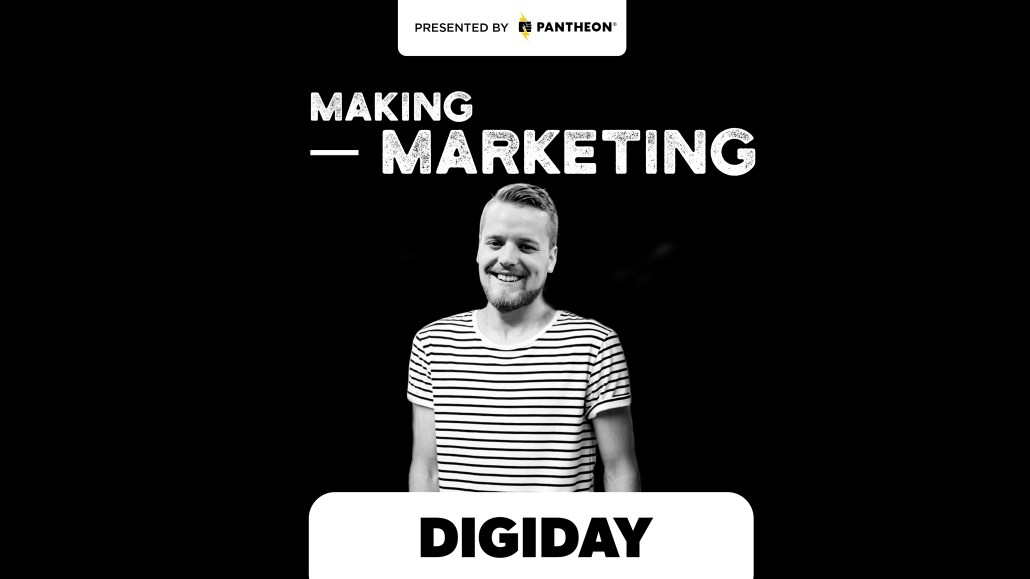Save 50% on a 3-month Digiday+ membership. Ends Dec 5.
Quip’s Shane Pittson: Being in physical stores makes us more accessible

Subscribe: iTunes | Google Play | Stitcher | RSS | Anchor
Electric toothbrush DTC brand Quip wants to grow up, and it is doing so by going beyond DTC.
As is common with many direct-to-consumer brands looking to scale, Quip participated in a pop-up, took to the New York City subways, and recently began selling its products in Target stores (although refills can only be bought directly from their website).
Now, following the acquisition of dental insurance brand Afora, Quip is looking to expand its offering into services. Quipcare, which will be rolling out this summer in New York City, has two options that will let customers partake in either a pay-as-you-go model which offers services at a discount or a $25-a-month model that resembles traditional dental insurance.
When asked about how the company plans to balance two very different businesses — products and healthcare — Shane Pittson, Quip’s vp of growth, said it’s all part of the same ecosystem. Customers can pick-and-choose which parts they would like to subscribe to, or they can subscribe to the full Quip “universe.”
“It’s hard for us to make the differentiation [between products and services] because we view all of it as part of the oral health routine,” said Pittson. “Generally speaking, people are looking for the best solution to their problems. The interoperability of systems is becoming easier, and we’re building what we think is the best environment — from your daily oral care products, through to booking and paying for quality, professional services.”
Ad position: web_incontent_pos1
On this week’s episode of Making Marketing, Shareen Pathak sits down with Pittson to discuss how Quip learned from its DTC peers in its early days, why its move into Target is part of an accessibility-focused mission and how it’s working to control the brand experience in places where it doesn’t have total control. Edited highlights below.
Learning from your peers
“I had a lot of conversations early on with team members at Harry’s, Warby Parker and at Casper. There’s a lot of collaboration, communication and comradery between those brands. In terms of taking cues from them, I know that one of the early things that we implemented after a lot of discussion with a team member at another digitally-native brand was our post-purchase survey. We had said, ‘Hey, we haven’t done a billboard yet. You’re doing billboards. How are you measuring its effectiveness?’ They said it was their post-purchase survey, and we realized we didn’t have one of those. So we dug into it, actually went through the checkout flow, saw how it was set up and used that to inform our own. That’s become a really key part of our attribution strategy.”
Physical retail means accessibility
“Core to Quip’s mission is accessibility. The product is positioned to help improve behaviors and get people more interested in their oral health, and we want to make that as accessible as possible. For some people, they’re already in Target doing a certain amount of product discovery and making purchases, so giving the consumer that option is really beneficial.”
Finding a way to manage the brand experience everywhere
“We care deeply about the entire brand experience, so all the way from ad exposure through to brand loyalty and continued education. Retail represents a different customer journey, so we spent a lot of time thinking about how our brand would come to life in retail. What does the packaging look like? What information is on the package? What do the in-store merchandising options look like? How do we bring a lot of the education that we’re used to doing at the advertising or web level, into a physical experience? That’s something we’re continually working on.”
More in Marketing

Ulta, Best Buy and Adidas dominate AI holiday shopping mentions
The brands that are seeing the biggest boost from this shift in consumer behavior are some of the biggest retailers.

U.K. retailer Boots leads brand efforts to invest in ad creative’s data layer
For media dollars to make an impact, brands need ad creative that actually hits. More CMOs are investing in pre- and post-flight measurement.
Ad position: web_bfu



